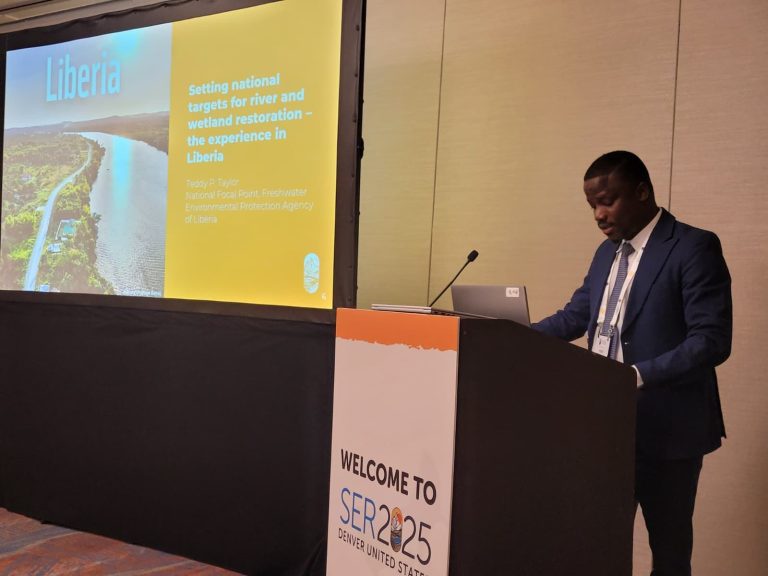Posts Categories
Latest Posts

Denver, Colorado, USA, October 4, 2025–The National Focal Point for Freshwater and Action for Climate Empowerment (ACE) at the Environmental Protection Agency (EPA) of Liberia, Teddy P. Taylor has called on the international community to support Liberia’s efforts to restore its rivers and wetlands, warning that the country’s water resources are under growing threat from climate change and human activity.
Speaking on October 3, 2025, at the Society for Ecological Restoration’s 11th International Conference in Denver, Taylor described Liberia as the “water tower of West Africa,” home to major rivers like the Cavalla, St. Paul, St. John, and Mano, which provide water, food, and livelihoods not only to Liberians but also to neighboring countries.
He highlighted the importance of wetlands such as Mesurado, Marshall, and Kpatawee, which serve as carbon sinks, biodiversity hotspots, and natural flood barriers. But he warned that these ecosystems are being strained by deforestation, pollution, and urban encroachment.
“This is the human face of freshwater degradation,” Taylor said. “In Monrovia, wetlands are used as dumping grounds. Farmers in Lofa face unpredictable rainfall, and fisherfolk along the St. Paul River are seeing their catches decline.”
For the first time, Taylor explained, Liberia has included specific freshwater adaptation targets in its updated Nationally Determined Contribution (NDC 3.0). These targets commit Liberia to restoring degraded wetlands, protecting watersheds, embedding nature-based solutions in climate planning, and involving youth and children in restoration efforts.
He pointed to a pilot project in the Mesurado Wetlands where mangrove restoration, carried out with local communities, has reduced flooding and boosted fish stocks. But he cautioned that scaling such projects nationwide requires sustained financing.
“If NDC 3.0 freshwater targets are not backed by investment, they risk remaining words on paper,” Taylor stressed.
One of Liberia’s key plans, he added, is to establish Natural Capital Accounting for freshwater ecosystems. By putting a monetary value on services like flood protection, irrigation, and drinking water, Liberia hopes to build stronger evidence for budget allocation and attract more investment.
Taylor cited global research showing that every $1 invested in wetland restoration generates up to $7 in avoided damages and ecosystem benefits. “Liberia wants to apply this rigor to our own context,” he said, “but we need technical and financial partnerships to make it happen.”
He outlined five priority areas where Liberia is seeking support: scaling up freshwater restoration, building natural capital accounting and monitoring systems, strengthening institutional and youth capacity, updating water laws and policies, and classifying the nation’s watersheds.
“The Freshwater Challenge aims to restore 300,000 kilometers of rivers and 350 million hectares of wetlands worldwide by 2030,” Taylor concluded. “Liberia is ready to play its part. But readiness alone is not enough, we need your partnership.”
